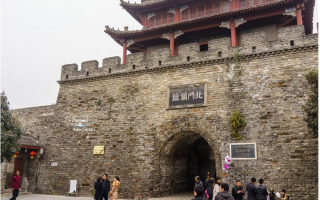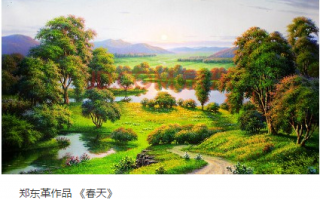《襄阳一日游》
- 2021-01-08 16:26:00
- 点赞量:13680
- 点击量:224871
- 作者:郝连成 Hao Liancheng
游历古迹,最易联想:不为功名富贵而苟且,不为成败荣辱而折腰,非真隐士,又几人能够? 201 3中国中小企业中部论坛暨第六届创业中国年度人物颁奖典礼会议期间,主办方安排了一天当地历史文化考察活动,武当山和市区三景一日游, 两处任选其一, 我们选择了后者,市区三景一日游。
It's easy to think about visiting historic sites: not for fame and wealth, not for success or failure, not for honor or disgrace, not true hermits, how many people can? 201 3 during the central forum of China's small and medium-sized enterprises and the sixth award ceremony of entrepreneur of the year in China, the organizer arranged a one-day local history and culture inspection activity, Wudang Mountain and urban three scenes one-day tour, one of two places, We chose the latter, a one-day tour of three scenic spots in the urban area.

襄阳城墙
Xiangyang City Wall
此处城墙的规模和北京的八达岭长城及浙江临海的长城都无法相比,使之著名的是金镛的武侠小说《倚天屠龙记》郭靖和黄蓉守襄阳的故事。然而在城墙上清朝同治二年的一-个碑刻却记载了一段东晋襄阳守将朱序的母亲韩夫人帮助朱序守城的故事。
The scale of the city wall here can not be compared with the Badaling Great Wall in Beijing and the Great Wall near the sea in Zhejiang. What makes it famous is the story of Guo Jing and Huang Rong guarding Xiangyang in Jin Yong's martial arts novel the story of relying on heaven to kill a dragon. However, on the wall of the city, a tablet in the second year of Tongzhi of the Qing Dynasty records a story about the help of Mrs. Han, the mother of Xiangyang garrison general Zhu Xu in the Eastern Jin Dynasty.
朱序,义阳(今河南信阳南)人,东晋名将,屡立战功。东晋孝武帝太元2年,朱序被任命为梁州刺史,镇守襄阳。太元3年2月,前秦皇帝苻坚为消灭东晋独霸天下,令其长子长乐公苻丕率领17万大军,分四路大举进攻东晋重镇襄阳。
Zhu Xu, a native of Yiyang (now Xinyang south of Henan Province), was a famous general of the Eastern Jin Dynasty, who made many achievements. In the second year of emperor Xiaowu of the Eastern Jin Dynasty, Zhu Xu was appointed governor of Liangzhou to guard Xiangyang. In February of the third year of Taiyuan Dynasty, Fu Jian, the former Emperor of Qin Dynasty, ordered his eldest son Fu PI, Changle Gong, to lead 170000 troops to attack Xiangyang, an important town in the Eastern Jin Dynasty.
襄阳老百姓闻讯大惊,晋军诸将也很害怕。守将朱序错误地认为襄阳城三面环水,一面依山,易守难攻,秦军全是北方人,不善水战,又无战船,难渡汉水攻取襄阳,因此没把敌人放在心上。
The people in Xiangyang were shocked by the news, and the generals of the Jin army were also very scared. General Zhu Xu mistakenly believed that Xiangyang City was surrounded by water on three sides and surrounded by mountains on the other side. It was easy to defend but difficult to attack. The Qin army was all northerners. They were not good at water warfare and had no warships. It was difficult to cross the Han River to capture Xiangyang, so they did not pay attention to the enemy.
朱序的父亲朱焘,曾任东晋西蛮校尉、益州刺史;其母韩夫人,早年曾跟随丈夫南征北战,颇知军事。她见秦军大军压境,很为儿子担心,夜不能眠,便亲自登城巡视,检查防御。她发现城墙西北角一带城砖崩溃,不牢固,很容易被秦军攻破。可儿子手下兵员紧张,连守城都顾不过来,哪里还有精力修城呢?韩夫人当即立断,马上召集全家女眷,并动员城内妇女,总共聚集一百多名“娘子军”,由她亲自率领,在西北角旧城里面,加紧修筑了一-道长达二十余丈的新城。这道新城墙,筑得十分牢固。之后,韩夫人又带领“娘子军”"日夜巡城,协助晋军守襄阳。
Zhu Tao, the father of Zhu Xu, was a captain of Ximan school in the Eastern Jin Dynasty and a governor of Yizhou; his mother, Mrs. Han, had been fighting with her husband in the South and North in her early years, and knew a lot about military affairs. Seeing that the Qin army was under pressure, she was worried about her son and couldn't sleep at night, so she went to the city to inspect her defense. She found that the bricks in the northwest corner of the city wall collapsed and were not strong enough to be easily broken by the Qin army. But her son's soldiers were so nervous that she couldn't even guard the city. Where else could she spare the energy to build the city? Mrs. Han immediately summoned the whole family and mobilized the women in the city. A total of more than 100 "women's troops" were gathered. Led by her, she built a new city of more than 20 Zhang long in the old city in the northwest corner. The new wall is very strong. Later, Mrs. Han led the "women's army" to patrol the city day and night to assist the Jin army in guarding Xiangyang.
不久,秦军石越率领五千骑兵渡过汉水,兵临襄阳城下,朱序大为震惊,于是命令晋军严守城池。石越率军攻破襄阳外城后,缴获晋军船只-一百多艘,让后续部队陆续渡江。苻丕率领大部队到达后,指挥秦军进攻内城。朱序带领晋军拼死抵抗,战斗异常激烈。秦军发现襄阳城西北角有漏洞,便乘机从这里攻破。幸有韩夫人先见之明修筑的新城墙作屏障,朱序率领晋军退 守这道防线,打退了秦军的进攻。
Soon after, Shi Yue of the Qin army led 5000 cavalry across the Han River and came to Xiangyang City. Zhu Xu was greatly shocked, so he ordered the Jin army to strictly guard the city. After Shi Yue led his troops to conquer the outer city of Xiangyang, he seized more than 100 Jin vessels and let the follow-up troops cross the river one after another. After the arrival of Fu Pi's troops, he commanded the Qin army to attack the inner city. Zhu Xu led the Jin army to fight fiercely. The Qin army found a loophole in the northwest corner of Xiangyang City and took the opportunity to break it. Fortunately, with the new city wall built by Mrs. Han's foresight as a barrier, Zhu Xu led the Jin army to retreat and beat back the Qin army's attack.
后人为纪念韩夫人的筑城抗敌之功,把西北角那段城墙称“夫人城”。现在又给韩夫人立了一尊汉白玉的戎装雕像,以示纪念,常有游城之人去上香许愿。唐代诗人岑参在《饯王岑判官赴襄阳道》一诗中提到夫人城:“故人汉阳使,走马向南荆。不厌楚山路,只怜襄水清。津头习氏宅,江上夫人城。夜入橘花宿,朝穿桐叶行。害群应自慑,持法固须平。暂得青门醉,斜光速去程。可见夫人城在唐朝时就有了名气。
In order to commemorate Mrs. Han's contribution in building a city to resist the enemy, later generations called the northwest corner of the city wall "Madame city". Now, a white marble military statue is set up for Mrs. Han as a memorial. People who visit the city often go to make a wish. CEN Shen, a poet of the Tang Dynasty, mentioned the city of Madame in his poem "farewell King judge Cen goes to Xiangyang Road": "my old friend, Hanyang envoy, is going to Jingnan. Not tired of Chushan Road, only pity Xiangshui clear. Xi's house in Jintou, Madame town on the river. Night into the orange flower night, toward wear Tung leaves line. The harm group should be self deterred, and the law should be maintained. I'll be drunk at Qingmen for a while. I'll go at oblique light speed. It can be seen that Madame city was famous in the Tang Dynasty.
经过千百年的变迁,城墙早已不是当年的城墙,故事也融入了更多的美化,每拨游客中都有到韩夫人雕象前烧香许愿的,那袅袅飘散的轻烟,能带去这些凡人们的祈祷心愿吗,旁观收香火钱的当地大嫂告诉游人:心诚则灵。
After thousands of years of changes, the city wall is no longer the city wall of that year, and the story has also incorporated more beautification. Every batch of tourists come to burn incense and make a wish in front of the statue of Madam Han. Can the curling smoke bring these people's Prayer wishes? The local sister-in-law who looks on to collect the incense money tells the tourists: sincerity is soul.

米公祠
Mi Gong Temple
原名米家庵,位于古樊城柜子城上,隔汉水与襄阳小北门相望。始建于元朝,明末毁于战火,现存全部建筑系清康熙至雍正年间重建。它是为纪念我国北宋时期杰出的书画大师米芾而修建的祠宇。米公祠里的亭、榭、桥、廊等巧妙布局,各处无不体现着古代文人雅士的情调。导游小姐介绍说:米芾祖籍山西太原, 曾任无为知军因他个性怪异,举止颠狂, 遇石称"兄”,膜拜不已,因而人称“米颠”。徽宗诏为书画学博士,人称“米南宫”。 米芾能诗文,擅书画,精鉴别,书画自成-家,创立了米点山水。集书画家、鉴定家、收藏家于-身。米芾擅水墨山水,人称“ 米氏云山”,但米芾画迹不存在于世。如今唯一能见到的, 也很难说是真正意义上的“米画"一《珊瑚笔架图》,画一珊瑚笔架,架左书“金坐”二字。然后再加,上米点和题款,米家山水便赫然而出。米芾以画代笔,颇有意趣。
Originally known as mi jia'an, it is located on the cupboard city of ancient Fancheng, facing the north gate of Xiangyang across the Han River. It was built in the Yuan Dynasty and destroyed in the war in the late Ming Dynasty. All the existing buildings were rebuilt during the Kangxi Yongzheng period of the Qing Dynasty. It was built in memory of the outstanding master of painting and calligraphy Mi Fu in the Northern Song Dynasty. The ingenious layout of pavilions, pavilions, bridges, corridors and so on in the MI Gong ancestral hall reflects the sentiment of ancient literati. guide Miss said: Mi Fu's ancestral home is Taiyuan, Shanxi Province, and he once served as Wuwei Zhijun. Because of his strange personality and crazy behavior, he was called "brother" when he met a stone and worshiped him constantly, so he was called "Mi Dian". Huizongzhao was a doctor of calligraphy and painting, known as "Minan Palace". Mi Fu is good at poetry, painting and calligraphy. He is a master of painting and calligraphy. He founded Midian landscape. It is a collection of calligraphers, appraisers and collectors. Mi Fu is good at ink landscape, known as "Mi cloud" But Mi Fu's paintings do not exist in the world. Today, the only thing we can see is "rice painting" and "coral brush holder" in the true sense. Then, with the addition of the rice dots and the title money, the landscape of the rice family stands out. Mi Fu's painting is quite interesting.
米芾平生于书法用功最深,成就最大。米芾自称自己的作品是集古字”,对古代大师的用笔、章法及气韵都有深刻的领悟,这也在一定程度上说明了米芾学书在传统上下了很大功夫。米芾未卷入政治漩涡,生活相对安定,后当上书画博士,饱览内府藏书,熟谙千载故事,古人得失,如数家珍。他少时苦学颜、柳、欧褚等唐楷,打下了厚实的基本功。苏轼被贬黄州时,他去拜访求教,东坡劝他学晋。米芾潜心魏晋,以晋人书风为指归,寻访了不少晋人法帖,连其书斋也取名为“宝晋斋”。今传王献之墨迹《中秋帖》,据说就是他的临本,形神精妙至极。米芾一生转益多师,在晚年所书《自叙》中也这样说道:“余初学,先学写壁,颜七八岁也。字至大一幅,写简不成,见柳而募其紧结,乃学柳《金刚经》。久之,知其出于欧,乃学欧。久之,如印板排算,乃慕褚而学最久,又摩段季转折肥美,八面皆全。久之,觉段全泽展《兰亭》,遂并看法帖,入晋魏平淡,弃钟方而师师宜宫,《刘宽碑》 是也。篆便爱《咀楚》、《石鼓文》 。
Mi Fuping was born in calligraphy. He studied hard and achieved the most. Mi Fu claimed that his work is a collection of ancient Chinese characters. He has a deep understanding of the ancient masters' pen, composition and charm, which also shows that Mi Fu has made great efforts in learning books. Mi Fu didn't get involved in the political whirlpool, and his life was relatively stable. Later, he became a doctor of calligraphy and painting. He had a good knowledge of the books collected by the inner government and was familiar with thousands of years of stories. When he was young, he studied Yan, Liu, Ou Chu and other Tang Kai hard, and laid a solid foundation. When Su Shi was demoted to Huangzhou, he went to visit for advice, and Dongpo advised him to learn from Jin Dynasty. Mi Fu devoted himself to the Wei and Jin Dynasties, and took the calligraphy style of the Jin people as the guide, and visited many calligraphy of the Jin people. Even his study was named "baojinzhai". Today, it is said that Wang Xianzhi's ink "zhongqiutie" is his copy, which is exquisite in form and spirit. In his later years, in his book autobiography, Mi Fu also said: "Yu Chu learns to write walls first, and Yan is seven or eight years old. It's a large one, but it can't be written simply. When you see Liu, you raise it tightly. You learn from Liu's Vajra Sutra. For a long time, I knew that it came from Europe, but I learned from Europe. For a long time, such as printing plate, it is the longest time for Chu to study, and it is full of all aspects. For a long time, Jue Duan Quanze exhibited "Orchid Pavilion", so he combined his views with the calligraphy. He entered the Jin and Wei dynasties and was insipid. He abandoned Zhong Fang and began to learn from Yi Gong. Zhuan loves zuichu and Shiguwen.
米芾以书法名世,他的成就完全来自后天的苦练。米芾每天临池不辍,史料记载:“一日不书,便觉思涩,想古人未尝半刻废书也。”、“智永砚成臼, 乃能到右军(王羲之), 若穿透始到钟(繇)、索(靖)也,可永勉之。”他儿子米友仁说他甚至大年初- -也不忘写字。 (据孙祖白《米芾米友仁》)。米带作书十分认真,自己说:“佘写《海岱诗》,三四次写,间有一-两字好,信书亦一难事”(明范明泰《米襄阳外记》)。一首诗,写了三四次,还只有- -两字自己满意,其中的甘苦非个中行家里手不能道,也可见他创作态度的严谨。
Mi Fu is famous for his calligraphy, and his achievements come from the hard work after tomorrow. According to historical records, "if you don't write a book every day, you will feel astringent and think that the ancients never abandoned the book." "Zhiyong inkstone can reach the right army (Wang Xizhi) when it becomes mortar. If it penetrates to Zhong (Yao) and Suo (Jing), it can be encouraged forever." His son, MI Youren, said he didn't forget to write even at the beginning of the new year. According to sun Zubai's Mi Fu and Mi Youren. Mi Dai was very serious in writing his book. He said: "she wrote Haidai poem three or four times, but there were one or two words between them. It was also difficult to write a letter" (MI Xiangyang waiji by fan Mingtai of Ming Dynasty). A poem has been written three or four times, but he is only satisfied with two words. The joys and sorrows in it are beyond the reach of a middle-class man. It can also be seen that his attitude towards creation is rigorous.

米芾除书法达到极高的水准外,其书论也颇多。著有《书史》、《海岳名言》 、《宝章待访录》、《评字帖》 等。显示了他卓越的胆识和精到的鉴赏力,对前人多有讥贬,然决不因袭古人语,为历代书家所重,但过头话也不少,诮颜柳、贬旭素,苛刻求疵。米芾传世墨迹主要有《苕溪诗卷》、《蜀素帖》 、《方圆庵记》 、《天马赋》 等,而翰札小品尤多。
In addition to the high level of calligraphy, Mi Fu also had a lot of calligraphy theories. His works include history of books, Haiyue's famous sayings, Baozhang waiting to be visited, pingzitie, etc. Although he never followed the ancient language, he was valued by the calligraphers of the past dynasties. However, he also made a lot of remarks, such as ridiculing Yan Liu, belittling Xu Su, and being critical. Mi Fu's ink mainly includes "Tiao"There are many essays, such as Xi Shi Juan, Shu Su Tie, Fang Yuan An Ji, Tian Ma Fu, etc.
在米公祠的长廊的正厅挂着很多米芾的书法拓片,导游小姐告诉我们这里展示的米芾书法作品只的一幅是真的,让我们自己去找。最后告诉我们为武当山题写的“第一山”三个字是拓片真迹,其他则都是后人临摹作品的拓印。
There are a lot of Mi Fu's calligraphy rubbings hanging in the main hall of the long corridor of MI Gong temple. The guide told us that only one of Mi Fu's calligraphy works displayed here is true. Let's find it by ourselves. Finally, it tells us that the three words "the first mountain" inscribed on Wudang Mountain are the original rubbings, and the others are the rubbings of the works copied by later generations.

即使这样,在米芾书法作品下拍照留念的人还是很多。在这里了解到米芾有洁癖到了每天洗手玑十次的程度。而他的婚姻也差点没因这洁癖的毛病而被岳母搞散,是他岳父力排众议说这样人做事必能专- -而成大器。
Even so, there are still many people taking photos under Mi Fu's calligraphy works. Here, I learned that Mi Fu was addicted to cleanliness and washed his hands ten times a day. And his marriage was almost not broken up by his mother-in-law because of this cleanliness problem. His father-in-law said that such a person would be able to do things professionally.
古隆中古隆中是三国时诸葛亮向刘备分析当下政局的地方,从襄阳城去往古隆中沿途可看到山势绵延起伏,- -路逶迤。山山首尾相连,岭岭.上下相拥,满坡的松柏翠竹苍郁道劲,甚而直插云宵,路边藤萝密布,花草低垂,书院、草庐、武侯祠和三顾堂错落有致,层层埋伏,花径通幽,神秘中透着庄严。一口古井深藏着三国故事,三株老槐诉说着刘关张结义真情。或有深潭囚龙,山涧流泉,古树参天。徘徊其间,可听虫鸟轻鸣,看光影流泄,感神清气爽,觉浑然我忘。仿佛踏了进时光隧道,进入了草堂春睡的梦乡。偶有清风拂面,乍然而醒,看路旁新建的大学校堂和标牌林立的旅游景,点,才感觉到重回现实。遂感慨淡泊明志,宁静致远在当下的浮躁社会该是多么的珍贵和难得。唐朝孟浩然说,隆中"其境过清,不可久居。“现在来这里感觉过清”的地方早已不多了。
Gulongzhong Gulongzhong is the place where Zhuge Liang analyzed the current political situation to Liu Bei during the Three Kingdoms period. From Xiangyang City to Gulongzhong, you can see the rolling mountains and winding roads along the way. The mountains are connected from end to end, and the mountains are surrounded by mountains. The pines, cypresses and bamboos on the slopes are full of vigor and vitality, and even go straight into the sky. The roadside is covered with vines and plants, and the flowers and plants are low. The Academy, the cottage, the temple of marquis Wu and the Sangu hall are scattered in perfect order. They lie in ambush layer upon layer, and the path of flowers is secluded, mysterious and solemn. An ancient well contains the story of the Three Kingdoms, and three old locusts tell the truth of Liu Guan and Zhang Jieyi. Or there are deep pools of dragons, mountain streams and flowing springs, and towering ancient trees. Wandering in the meantime, you can hear insects and birds singing, see the light and shadow flowing, feel refreshed, feel I forget. It's like stepping into the time tunnel and sleeping in the thatched cottage. I wake up suddenly when I see the newly-built university hall and the tourist scenery with lots of signs on the road. I feel that I am back to reality. Then he sighed how precious and rare it is in the impetuous society. Meng Haoran of the Tang Dynasty said that Longzhong "is too clear to live in for a long time. There are not many places where "I've been here for a long time."It's too late.
隆中的草庐各处都可见评价诸葛亮的诗文:
There are many poems about Zhuge Liang in Longzhong
志见出师表,
If you want to see a teacher, you can set an example,
好为梁父吟。
Good for Liang Fu Yin.
功盖三分国,
Three thirds of the country has been established,
名成八阵图。
It's called eight array.
两表酬三顾,
Two forms of remuneration, three considerations,
一对足千秋。
for thousands of years.
淡泊以明志,
To be indifferent is to show one's ambition,
宁静而致远。
Peace and distance.
智谋隆中对,
Wise and resourceful,
三分天下;
Three parts of the world;
三顾频烦天下计,
Three times, I've been bothering the world,
两朝开济老臣心。
The two dynasties opened the door to the old minister's heart.
几乎随处可见这些读起来回肠荡E气的佳句妙文,遥想当年诸葛亮就住在这里,抚足长吟,该是何等的闲适-与惬意,到后来也仅落得“壮志未酬身先死,长使故人泪满襟的嘘唏,游历古迹,最易联想:不为功名富贵而苟且,不为成败荣辱而折腰,非真隐士,又几人能够?
Almost everywhere you can see these wonderful sentences and essays, which are full of e-spirit in the ileum. When you think about how comfortable Zhuge Liang was when he lived here, caressing his feet and chanting for a long time, later he only came to the end of "dying before his ambition, making his old friend cry. When you travel to historic sites, you can most easily think of it: not for fame and wealth, not for success or failure, not for honor or disgrace, not true hermits, how many people can Enough?
望着后人来隆中后留下的感慨诗句,想着当年的三国分争,忽然一个念头涌了出来:如果当年诸葛亮要是不那样死保阿斗而与曹操合:二为一,再联起东吴,那时的中华帝国该会有多么的强大。四夷八荒谁敢小觑?只可叹诸葛亮把满怀的经天纬地之才化做了国家统一的障碍。时光不能倒转,过去的就是过去,只有思想可象林中的草虫-样无目标地乱飞。
Looking at the poems left by later generations after coming to Longzhong, thinking about the division of the Three Kingdoms in those years, an idea suddenly came out: if Zhuge Liang didn't protect ah Dou and join with Cao Cao in those years, how powerful the Chinese Empire would be at that time. Who dares to underestimate the four barbarians and eight wastelands? It's only a pity that Zhuge Liang turned his talent full of wisdom into an obstacle to national unification. Time can not be turned back, the past is the past, only thoughts can fly aimlessly like grass and insects in the forest.
郝连成2013-09-19湖北襄阳
Hao Liancheng September 19, 2013 Xiangyang, Hubei





雁在蓝天